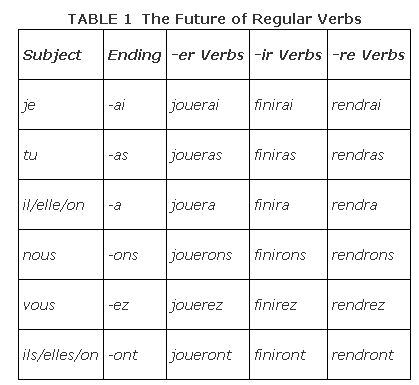The future tense is used to express a future action or state, that is, what will happen in a future time.
Future tense of regular verbs
The future tense of regular verbs is formed by adding the endings shown in Table 1.

Note that the ending for the je, tu, il, and ils form is the present tense of avoir. The nous form is formed by adding ‐ons; the vous form is formed by adding ‐ez.
Note the following about forming the future tense of regular verbs:
Endings are added to the complete infinitive of ‐er and ‐ir verbs.
For ‐re verbs, drop the final e before adding the appropriate future ending:
For ‐er verbs, if the stem has two consecutive pronounced consonants before ‐er, the e of the ‐er infinitive ending is pronounced:
If the stem has one pronounced consonant before ‐er, the e of the ‐er infinitive is silent:
Spelling changes in the future tense
All verbs that require spelling changes form the future in the same way as regular verbs: infinitive + future ending. The following are exceptions to this rule:
For verbs ending in ‐yer (except envoyer, which is irregular and has enverr‐ as its stem), change y to i in all forms of the future tense. Verbs ending in ‐ayer may or may not make this change:
- je netto ierai, nous netto ierons (I will clean, we will clean)
- j'essa ierai or j'essa yerai (I will try)
For verbs ending in e + consonant + ‐ er (but not é + consonant + ‐er), change the silent e before the infinitive ending to é in all forms of the future tense:
- tu am éneras, vous am énerez (you will bring)
With appeler and jeter, double the consonant in the future tense:
- vous appellerez (you will call)
- vous jetterez (you will throw)
Future tense of irregeular verbs
Verbs that are irregular in the future (and the derivatives of these verbs) have future stems (verb forms to which endings are added) ending in ‐r or ‐rr. Add the future endings to these stems to get the correct future form, as shown in the following list.

For example:
- J'irai en ville cet après‐midi. (I'll go downtown this afternoon.)
- Tu recevras une surprise. (You'll receive a surprise.)
Irregularities in the future also occur in related verbs:
- Je te reverrai demain. (I'll see you tomorrow.)
Negating in the future tense
To negate a sentence in the future, simply put ne and the negative word around the conjugated verb:
- Nous ne saurons pas tout de suite les résultats. (We won't know the results immediately.)
- Il ne fera rien demain. (He won't do anything tomorrow.)
Remember that pronouns remain before the conjugated verb:
- Elle ne t'enverra pas le paquet avant mercredi. (She won't send you the package before Wednesday.)
Questions in the future
To form a question using inversion, reverse the order of the subject pronoun and the verb and join them with a hyphen:
- Fera‐t‐il une partie de tennis ce matin? (Will he play a game of tennis this morning?)
- Travaillerez‐vous pendant le week‐end? (Will you work on the weekend?)
To negate an inverted question, put ne and the negative expression around the inverted form. Remember that all object and adverbial pronouns must remain before the conjugated form of the verb:
- Ne lui direz‐vous pas la vérité? (Won't you tell him [her] the truth?)
- N'y iront‐elles pas? (Won't they go there?)
Uses of the future
Note the following about when and when not to use the future in French:
Be careful to distinguish “will” as used to form the future and the verb vouloir (to wish, to want), which translates as “will” when it expresses “willingness”:
- Je t'aiderai. (I will help you.)
- Veux‐tu m'aider? (Will you [do you wish, are you willing to] help me?)
The future tense is NOT used in French in a subordinate clause requiring the subjunctive:
- Je doute qu'il réussisse. (I doubt he will succeed.)
When the main clause is in the present tense, the future or the present may be used after croire que (to believe that), penser que (to think that), savoir que (to know that), espérer que (to hope that), and ne pas savoir si (to not know if) to express a future action:
- Je pense qu'il vient.
- Je pense qu'il viendra.
- I think he is coming (is going to come, will come).
The future may be used conversationally to express probability or supposition, especially with avoir and ětre:
- Elle ne mange rien. Elle sera malade. (She isn't eating anything. She must be sick.)
- Il crie de toutes ses forces. Il aura peur. (He's screaming at the top of his lungs. He must be afraid.)
The future tense is used after the following conjunctions of time when the verb in the main clause is in the future tense, even if the present tense is used in English:
quand, lorsque, au moment où (when)
- Je lui parlerai quand ( lorsque, au moment où) il arrivera. (I will speak to him when he arrives.)
dès que, aussitôt que (as soon as)
- Dès que ( Aussitôt que) tu me téléphoneras, je viendrai te chercher. (As soon as you call me, I'll come get you.)
pendant que, tandis que (while)
- Je lirai pendant que ( tandis que) mon mari jouera au golf. (I'll read while my husband is playing golf.)